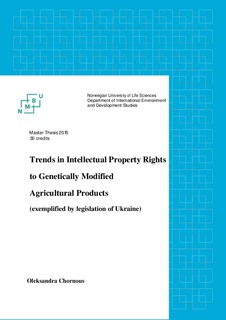| dc.description.abstract | Genetically modified agricultural products (hereinafter-GMAPs) are produced based on genetic resources (hereinafter - GRs), which could be treated as valuable ecological (for functioning of the ecosystem) and economic (for social development) resources. They are identified as part of the environment and commercialized particles/processes of nature with implementation of the UN Convention on Biological Diversity, 1992 (hereinafter - CBD), and the Agreement on Trade Related Aspects of Intellectual Property Rights of the World Trade Organization, 1994 (hereinafter - TRIPS), respectively. The international community faces new challenges in establishing legal regimes for GMAPs, based on the principles of fairness, equality, ensuring of private property, and precautionary principle.
This thesis examines implementation of CBD and TRIPS (as regards IPRs to GMPs) in developing countries (Ukraine is taken as an example). The legal framework on IPRs to GMAPs in Ukraine is analyzed together with socio-economic factors that affect its efficiency. The thesis also investigates legal nature and social functions of patenting as one of the disputable types of IPRs to GMAPs. Finally, consideration is given to the potential of GR management at the national level.
Theoretical approach is combined with practical examples of genetic resource management. That combination helps to identify obstacles in the development of genetic resource management, analyze the effectiveness of the existing legal rules, and understand the trends in IPRs to GMAPs. Some recommendations to improve the legal regime of IPRs to GMAPs in Ukraine are formulated.
This master thesis employs the method of qualitative analysis, investigating the general issues on environmental and trade regimes of GRs, and the conditions of compliance of Ukraine with appropriate international and European requirements. Discourse analysis is used to identify points of view and issues which shape debates about IPRs to GMAPs. An interview clarifies the Russian legal perspective on GRs. | nb_NO |

